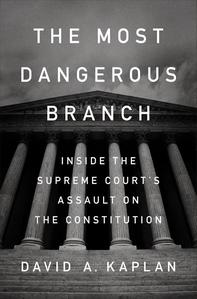
|
|
| photo: Damien Donck/Newsweek | |
With a divisive president and a Congress whose hyper-partisanship produces mostly gridlock, describing the Supreme Court as the "most dangerous branch" may strike some people as odd. What's your justification for that label?
Of course it is the president who can start a nuclear war or commit troops in faraway lands. And Congress can pass foolish laws (or do nothing at all), often beholden to special interests. But I would argue that the power grab by the justices in recent decades is more insidious, more potentially destructive of American values in the long term.
Aren't there times when the Court simply is stepping into a void caused by the failures of the other branches? And if so, what's wrong with that?
I think that's right--the justices surely did that, for example, in Bush v. Gore in 2000, even though both a federal statute and the Constitution explicitly provided otherwise. But where does the Court derive any authority to intervene simply because other branches are derelict? That's "activism" of the worst kind, a presumption that judges somehow know best. In fact, sometimes Congress may fail to act precisely because it knows the Court will.
Whether it's decisions on abortion and gay marriage that delight liberals, or those on gun control and campaign finance that please conservatives, what you call the Court's "steady, institutional self-aggrandizement" proceeds unabated. How has that become its dominant philosophy?
The justices "do" because they "can"--and almost nobody in civic life pushes back. Liberals and conservatives, Democrats and Republicans, libertarians and statists--they all agreed when Justice Antonin Scalia died in 2016 that his successor could "transform" American life "for a generation." Those predictions are even louder now, with the retirement of Justice Anthony Kennedy. The Most Dangerous Branch aims to challenge that orthodoxy.
From what you know of Brett Kavanaugh, will his ascension to the Court continue this trend?
I've known him for a decade, but I don't profess knowledge of what lies deep in his constitutional heart. On a lower court, he's been bound by Supreme Court precedent--as well as the fact that at some level he was "running" for the Court. But while he (and most other judges) profess fondness for "judicial restraint," there's a lot in his opinions that suggests affection for judicial triumphalism. It's very difficult to find judges who follow through on their claims of humility and judicial minimalism. I think the justice that most recently came closest to it was John Marshall Harlan in the 1960s. On the current Court, I think it's Justice Breyer who most frequently tries to defer to representative government (unwise as democracy often may be).
 Speaking of Kavanaugh, is there anything that can be done to fix a Senate confirmation process you say is "broken?"
Speaking of Kavanaugh, is there anything that can be done to fix a Senate confirmation process you say is "broken?"Put me in charge! Next to that, I think it's highly unrealistic to expect either side to unilaterally disarm. Indeed, I think that when the Democrats do get control, you'll see further escalation--perhaps even energetic calls for Court-packing to undo a conservative majority and to retaliate for what was done to Judge Merrick Garland when his nomination to the Court by President Obama was stonewalled in 2016. Democrats could move to add two seats and thereby secure a liberal majority on the Court, or more modestly, to add a single seat, which would result in significant 5-to-5 ties and force the Court to form a super-majority to get anything done. In 1937, FDR's Court-packing plan was universally condemned, but that hardly means such a scheme never could succeed. We live in hyper-partisan times and have already seen the death of the filibuster for federal judges.
In a perfect world, I'd like to see a wholesale change in attitude on the Court's part--and correspondingly, on our part--of what we expect from the justices. We expect far too much. But I'd also endorse major changes in how we select justices--for example, enacting an 18-year term limit, with terms staggered so every president gets to appoint; or perhaps just staffing the Court with a rotating mix of chief judges chosen randomly from lower federal appeals courts.
As you recognize in discussing history--for example, the 1930s Court's hostility to FDR's New Deal--there have been pendulum swings in its jurisprudence. How likely are we to see a move back toward more judicial restraint any time soon and what might it take to prompt that?
History suggests that if the Court veers to the extreme right there will be a reaction. That will be because either the public so vociferously objects that the Court recalibrates, or because the public elects a different kind of president who will appoint more liberal justices. But neither reaction necessarily means more judicial restraint--they just mean a pendulum swing from a triumphalist Court of the right to a triumphalist Court of the left. We long ago abandoned any principled notion of a Court that truly holds back.
We all favor "judicial restraint" and oppose "judicial activism"--except, naturally, when we don't, in which case we just call them by the opposite label. Judicial restraint--and its cousin, "strict construction" of the Constitution--are the chameleons of American law, instantly able to change philosophical color when expediency requires. "Judicial activism" is what the other guy does. In truth, though, almost everybody's an activist today.
Despite his decisive vote to uphold the Affordable Care Act in 2012, Chief Justice John Roberts has been a fairly reliable member of the conservative wing of the Court. Why are you optimistic that he represents the "best hope" for the Court to "regain its stature?"
I wouldn't quite say "optimistic." But the chief justice will now be the "swing" vote, replacing Kennedy in what passes for the ideological middle of the Court. Temperamentally and constitutionally, Roberts is most likely to want to protect the Court's prestige. That could mean trying to rein in what may well be the overturn-any-precedents-we-don't-like radicalism of the Thomas-Gorsuch-Alito faction (we will have to wait and see if Kavanaugh's a member). The chief certainly has his ideological projects--to eradicate racial preferences and to deregulate political campaigns--but I think more important to him than any substantive outcome is preserving the Court's reputation. His love for the institution is authentic.
In the book's concluding chapter, you discuss some suggestions for reform, including term limits for Supreme Court justices. What would it take for such reforms to occur and what might be the source of pressure for them?
Terms limits or, for example, having a rotation of chief judges from the lower federal courts, would require a constitutional amendment. It will never happen. There's just too much incentive for the political party in power to say no. More likely (though not a whole lot more), would be that successive escalations might convince both sides that enough was enough. If, say, Democrats succeeded in packing the Court in 2021 or 2025, and Republicans then engaged in their own Court-packing down the road, one could imagine everyone would come to agree that the Court's integrity was being destroyed.
The fundamental problem with life tenure for justices (and all federal judges) is that life expectancy now is so much longer than in the time of Jefferson and Madison. One well-known federal judge recently called the federal judiciary "the nation's premier geriatric occupation"--and it wasn't a compliment. Presidents today have a disproportionate incentive to name youthful justices who might serve 30 years or longer, thereby robbing the Supreme Court of an entire category of qualified nominees who are deemed to have passed their "sell-by" date. Once upon a time, an ambitious staff lawyer in the Reagan administration ardently argued for a 15-year term limit for federal judges. His name was John Roberts. --Harvey Freedenberg, freelance reviewer

